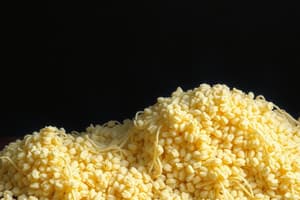Podcast
Questions and Answers
What is the first step in the process of carbohydrate metabolism?
What is the first step in the process of carbohydrate metabolism?
- Conversion of excess glucose into fat
- Production of ATP via the electron transport chain
- Digestion of complex carbohydrates into simple sugars (correct)
- Transport of glucose to cells
Which type of fiber is known for its ability to dissolve in water and can help lower cholesterol levels?
Which type of fiber is known for its ability to dissolve in water and can help lower cholesterol levels?
- Insoluble fiber
- Soluble fiber (correct)
- Resistant starch
- Non-digestible carbohydrates
What effect do high glycemic index foods have on blood glucose levels?
What effect do high glycemic index foods have on blood glucose levels?
- They cause a slight increase in blood glucose
- They cause a rapid rise in blood glucose (correct)
- They completely prevent glucose absorption
- They have no effect on blood glucose
Which hormone is primarily responsible for lowering blood glucose levels?
Which hormone is primarily responsible for lowering blood glucose levels?
What is the primary reason dietary fiber is crucial for digestion?
What is the primary reason dietary fiber is crucial for digestion?
When glycogen stores are full, what happens to excess glucose?
When glycogen stores are full, what happens to excess glucose?
Which process within cells is primarily responsible for producing ATP from glucose?
Which process within cells is primarily responsible for producing ATP from glucose?
How can consuming low glycemic index foods benefit overall health?
How can consuming low glycemic index foods benefit overall health?
Flashcards
Carbohydrate classification
Carbohydrate classification
Carbohydrates are categorized into monosaccharides (simple sugars), disaccharides (double sugars), and polysaccharides (complex carbohydrates).
Simple sugars function
Simple sugars function
Simple sugars, like glucose, fructose, and galactose, are quickly absorbed and provide immediate energy.
Complex carbohydrates breakdown
Complex carbohydrates breakdown
Complex carbohydrates, made of long chains of simple sugars, break down into simpler forms for energy.
Dietary fiber function
Dietary fiber function
Signup and view all the flashcards
Glycemic Index
Glycemic Index
Signup and view all the flashcards
High GI foods
High GI foods
Signup and view all the flashcards
Carbohydrate energy source
Carbohydrate energy source
Signup and view all the flashcards
Glucose energy production
Glucose energy production
Signup and view all the flashcards
Study Notes
Carbohydrates: An Overview
- Carbohydrates are organic compounds composed of carbon, hydrogen, and oxygen. They serve as a primary source of energy for the body.
- Carbohydrates are classified into three main types: monosaccharides (simple sugars), disaccharides (double sugars), and polysaccharides (complex carbohydrates).
- Simple sugars, like glucose, fructose, and galactose, are readily absorbed and provide quick energy.
- Complex carbohydrates, comprised of long chains of simple sugars, are broken down into simpler forms for energy.
- Dietary fiber, a type of complex carbohydrate, is indigestible by humans and plays crucial roles in digestion and bowel health.
Carbohydrate Metabolism
- Digestion breaks down complex carbohydrates into simple sugars, primarily glucose.
- Glucose is absorbed into the bloodstream and transported to cells.
- Inside cells, glucose undergoes processes like glycolysis, the Krebs cycle, and the electron transport chain to produce ATP (adenosine triphosphate), the cell's primary energy currency.
- When glucose intake exceeds immediate energy needs, it can be stored as glycogen in the liver and muscles.
- When glycogen stores are full, excess glucose can be converted into fat and stored for later use.
- The body maintains blood glucose levels within a narrow range through the actions of hormones like insulin and glucagon.
Dietary Fiber
- Dietary fiber, a type of complex carbohydrate, resists digestion in the small intestine.
- Two main types of fiber exist: soluble and insoluble.
- Soluble fiber dissolves in water and can help lower cholesterol levels.
- Insoluble fiber promotes regular bowel movements.
- Dietary fiber provides bulk to the stool, aiding in digestion and preventing constipation.
- It plays a role in maintaining gut health and may help manage weight.
Glycemic Index
- The glycemic index (GI) ranks carbohydrates based on their effect on blood glucose levels.
- Foods with a high GI cause a rapid rise in blood glucose after consumption.
- Foods with a low GI cause a slower and more gradual increase in blood glucose.
- The GI is influenced by factors like the type of carbohydrate, processing methods, and the presence of other nutrients.
- Choosing foods with a lower GI can be beneficial for managing blood sugar levels.
Role in Energy Production
- Carbohydrates are a crucial source of energy for the body, supplying the majority of fuels for cells.
- Glucose, the most readily used form of carbohydrate, provides energy for basic bodily functions.
- Stored glycogen is a readily accessible source of energy, particularly during physical activity.
- The breakdown of carbohydrates releases energy needed for cellular processes like muscle contractions, nerve impulses, and synthesis of new molecules.
- When other energy sources are scarce, the body can utilize stored carbohydrates (glycogen) for energy.
- A diet inadequate in carbohydrates can lead to a decrease in energy levels.
Studying That Suits You
Use AI to generate personalized quizzes and flashcards to suit your learning preferences.
Description
This quiz covers the essential aspects of carbohydrates, including their types, functions, and metabolic processes. Participants will learn about monosaccharides, disaccharides, polysaccharides, and how the body transforms these sugars into energy. Test your knowledge on the vital role carbohydrates play in nutrition and metabolism.




